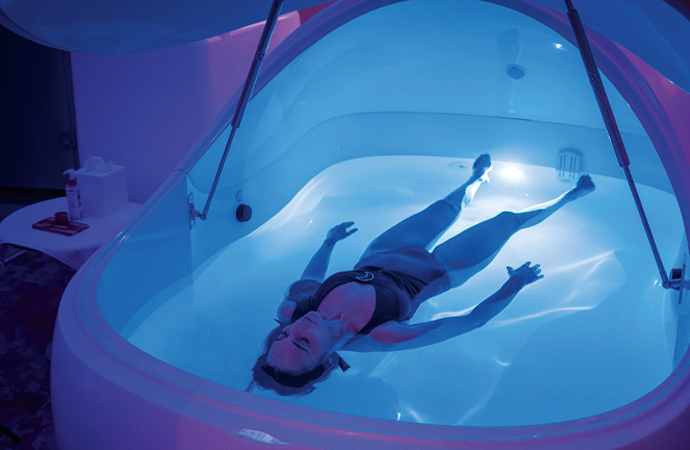Try Float Therapy at These Hotels and Spas Around the World
The practice is an increasingly popular option to reduce stress and bolster creativity
February 28, 2024

Castle Hot Springs, Morristown, Arizona / Photo: Courtesy of Castle Hot Springs
From social media to the 24-hour news cycle, overstimulation has become the status quo. Our brains constantly ping-pong between tasks and to-dos. For many, this busy brain sensation has become so familiar that we don’t even register the steady onslaught of stimulation—or the negative effects it can have, such as anxiety, irritability and loss of focus.
Some turn to practices like meditation and journaling to calm the chaos, but an increasingly popular experience takes mindfulness a step further: float therapy. During these sessions, participants float in a tank of warm water saturated with Epsom salts. This proliferation of salt makes floaters buoyant, while the lack of light and noise helps the body and mind reset.
“In the purest form of sensory deprivation, you feel nothing,” says Mandy Rowe, president of True REST Float Spa, which offers float therapy experiences across the U.S. “The water is at skin temperature, so you don’t feel like you’re in water at all. It’s like floating through outer space.”
Float therapy originated in the 1950s, but has recently gained steam as renowned athletes such as Tom Brady and Stephen Curry swear by the practice. In addition to quieting the mind, float therapy aids visualization, bolsters creativity and focus, and may even expedite exercise recovery. According to a study in The Journal of Strength and Conditioning Research, one hour of float therapy can lower blood lactate levels and reduce pain post-workout, helping athletes rebound and get back to their sport more quickly.
Pair that with the experience’s myriad other health benefits, like reduced stress and anxiety, and it’s easy to see why wellness enthusiasts have added float therapy to their monthly, or even weekly, routines. “The more you float, the better it gets,” says Rowe. “One float can help alleviate what you’re feeling in the moment—panic, anxiety, pain or insomnia. But if you want to keep those conditions at bay, one float a week would be ideal.” Most sessions run for 45 to 90 minutes. These days, you can reap the sensory deprivation benefits at facilities in most large and midsized cities. True REST Float Spa alone has 46 locations, including tanks in the D.C. and Chicago areas. Additional companies, from Float House in Vancouver to Vitality Wellness Center in St. Petersburg, Florida, ensure sensory deprivation is almost always within reach. Hotels and spas increasingly offer float therapy to help guests recover and unwind, too.
After a long day on the Colorado slopes, skiers, snowboarders and hikers can heal their bodies (and minds) at The Lodge at Vail’s RockResorts Spa, which offers a private float experience in pods saturated with 800 pounds of Epsom salts. For the ultimate treat, add a sports massage pre- or post-soak. These treatments, paired with The Lodge’s unbeatable access to Vail Mountain, make it one of the state’s best adventure-meets-wellness escapes.
Speaking of snow sports, few locales wow skiers like the Swiss Alps—and for that, wellness hub Six Senses Crans-Montana provides enviable ski-in, ski-out access. The hotel, located in the heart of Swiss village Crans-Montana, is just as much about wellness and recovery as it is outdoor fun—starting with its 60- and 90-minute float therapy sessions. Six Senses Crans-Montana’s flotation pods are further complemented by breath-work, meditation and sound-therapy offerings, which are all available in the 21,500-square-foot spa.
For a guided float therapy experience, head to desert oasis Castle Hot Springs, tucked away in a tranquil canyon north of Phoenix. The resort offers 60- and 90-minute floats, including Watsu, where therapists slowly move participants’ bodies to the rhythm of the water. The treatment eases tension and improves inner balance and range of motion. Another staple, aquatic energy balancing, adds a focus on chakras, meridians and aura to hot-spring floats, with a goal of helping participants eliminate energy blockages and restore overall balance.

At Whatley Manor, Easton Grey, England / Photo: Courtesy of Whatley Manor
Whatley Manor, a charming accommodation in England’s fairy-tale-like Cotswolds region, helps guests unwind and recenter via flotation pods packed with 1,100 pounds of Epsom salts. Combine these floats, which include soft background music, with treatments at Whatley Manor’s Aquarias Spa. Offerings range from deep-tissue massages to Gaia crystal-therapy rituals and mind-clearing sessions.
Head down under for the ultimate float retreat. The Wellness Hotel, a well-being sanctuary outside Sydney, runs sessions that feel like floating in space. Starlights adorn the ceilings above The Wellness Hotel’s flotation tanks, which are saturated with 1,300 pounds of magnesium-rich mineral salts. Soft, ambient music helps you unwind, while the spa’s many other offerings, such as ice baths and infrared saunas, ensure you leave both refreshed and invigorated.




